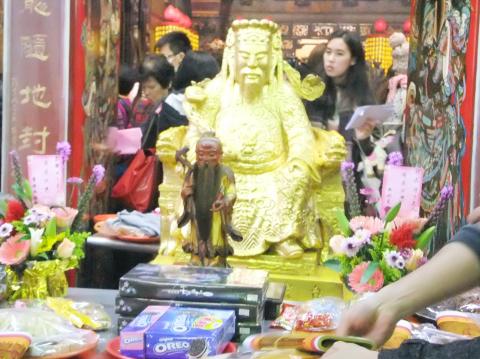One of old Taipei’s most popular deities is going on a historic visit to Japan and he has an important mission — to help find love matches for single Japanese looking to get married.
Known as the “Old Man Under the Moon” (月下老人) or just the “Moon Elder” (月老), the legendary figure said to originate from the Tang Dynasty has been venerated at Taipei’s Xia Hai City God Temple (霞海城隍廟) in the Dadaocheng area (大稻埕) since his statue was consecrated at the temple in 1971.
It is the first time the deity is taking a trip overseas, a three-day tour of Okinawa starting on Friday, which is Valentine’s Day.

Photo: Shih Chih-ju, Taipei Times
A delegation from Okinawa visited the City God Temple on Saturday to present an official invitation. Unmarried members of the delegation gave offerings and conducted a ritual, seeking help to find their love matches.
Hsieh Cheng-chun (謝正君), administrator of Taipei’s Datong District (大同) where the temple is located, said the deity had agreed to the overseas trip.
“The ‘Moon Elder’ gave his consent. We did this using the divination ritual of Bua-buei (筊杯) [casting of two crescent-shaped paired wooden divination devices],” Hsieh said. “In the temple, we have several consecrated ‘Moon Elder’ deity statues. The one going to Japan is a ‘horcrux’ [a figure with magical powers that contains parts of the deity’s soul]. It will be taken aboard the plane as a piece of carry-on luggage by a temple official.”
He said the deity would travel to Okinawa so that Japanese single men and women could worship it.
“Taiwanese can still come to our temple on Valentine’s Day. We have the ‘Moon Elder’ main deity figure, who will provide his regular service,” Hsieh said.
The visit to Okinawa is a collaboration with the Okinawa Industry Promotion Public Corp, a government agency.
“Activities also include karaoke singing contests, along with the promotion of Taiwanese tea, braised pork rice and other Taiwanese products in Okinawa,” he said.
Although the City God Temple on Dihua Street (迪化街) is not big, it attracts large numbers of devotees at weekends and on holidays.
Single people worship the “Moon Elder” in an attempt to find a love match, while those who are married can seek to obtain a “Shoe of Happiness” from the wife of the deity, as many believe that placing the shoe inside a closet at home can ensure a harmonious relationship.
In recent years, increasing numbers of Japanese tourists have visited the temple.
On Saturday, a 26-year-old Japanese visitor with the surname Ishihara said it was his first visit to the temple.
“I wish to find a pretty girlfriend. We heard people can obtain red linen from the ‘Moon Elder,’ which can help find a person’s true love. If my wish comes true and I marry a good woman, then I shall bring my wife to Taiwan for our honeymoon and present offerings to thank the deity,” Ishihara said.

A Taiwanese software developer has created a generative artificial intelligence (AI) model to help people use AI without exposing sensitive data, project head Huang Chung-hsiao (黃崇校) said yesterday. Huang, a 55-year-old coder leading a US-based team, said that concerns over data privacy and security in popular generative AIs such as ChatGPT and DeepSeek motivated him to develop a personal AI assistant named “Mei.” One of the biggest security flaws with cloud-based algorithms is that users are required to hand over personal information to access the service, giving developers the opportunity to mine user data, he said. For this reason, many government agencies and

The National Fire Agency on Thursday said a series of drills simulating a magnitude 8.5 earthquake would be held in September to enhance the government’s emergency response capabilities. Since earthquakes cannot be predicted, only by continuously promoting disaster prevention measures could Taiwan enhance its resilience to earthquakes, agency Director-General Hsiao Huan-chang (蕭煥章) said in a news release. The exercises would be held to mark annual National Disaster Prevention Day on Sept. 21, the aim of which is to test Taiwan’s preparedness and improve its earthquake resilience in case of a major temblor, Hsiao said. As part of those drills, an earthquake alert would

DEFENSE: The National Security Bureau promised to expand communication and intelligence cooperation with global partners and enhance its strategic analytical skills China has not only increased military exercises and “gray zone” tactics against Taiwan this year, but also continues to recruit military personnel for espionage, the National Security Bureau (NSB) said yesterday in a report to the Legislative Yuan. The bureau submitted the report ahead of NSB Director-General Tsai Ming-yen’s (蔡明彥) appearance before the Foreign and National Defense Committee today. Last year, the Chinese People’s Liberation Army (PLA) conducted “Joint Sword-2024A and B” military exercises targeting Taiwan and carried out 40 combat readiness patrols, the bureau said. In addition, Chinese military aircraft entered Taiwan’s airspace 3,070 times last year, up about

STRICTER ENFORCEMENT: Taipei authorities warned against drunk cycling after a sharp rise in riding under the influence, urging greater public awareness of its illegality Taipei authorities have issued a public warning urging people not to ride bicycles after consuming alcohol, following a sharp rise in riding under the influence (DUI) cases involving bicycles. Five hundred and seven people were charged with DUI last year while riding YouBikes, personal bicycles, or other self-propelled two-wheelers — a fourfold increase from the previous year, data released by the Taipei Police Department’s Traffic Division showed. Of these, 33 cases were considered severe enough to be prosecuted under “offenses against public safety,” the data showed. Under the Road Traffic Management and Penalty Act (道路交通管理處罰條例), bicycles — including YouBikes and other